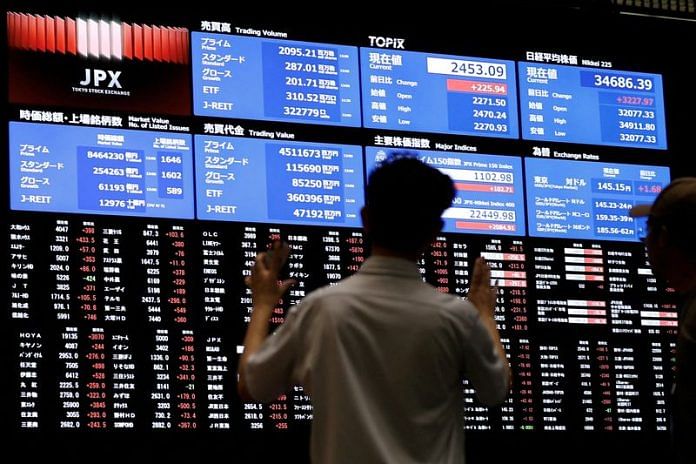By Elizabeth Howcroft
PARIS (Reuters) -European stock markets fell on Thursday and Wall Street was set to open lower, as shares in some of the world’s biggest carmakers tumbled after U.S. President Donald Trump announced new tariffs on auto imports.
Trump announced 25% tariffs on all vehicles and foreign-made auto parts imported into the United States late on Wednesday, prompting heavy losses in Japanese and South Korean stocks in Asian trading overnight.
U.S. automakers lost ground after the bell. General Motors slumped 6%, while shares in Ford fell almost 5%, reflecting concerns about the impact on their supply chains.
European stocks fell, with shares in Europe’s top carmaker Volkswagen taking a hit, along with BMW and Mercedes-Benz. The STOXX 600 hit its lowest since March 14, and was down 0.8% on the day at 1209 GMT.
The FTSE 100 was down 0.8% and Germany’s DAX was also down 1%, as investors braced for impact on Germany’s automotive sector.
Euro zone bond yields dropped, with Germany’s 2-year yield hitting its lowest since March 5.
Wall Street futures were in the red, with S&P 500 e-minis down 0.1% and Nasdaq futures down 0.3%.
The tariffs are the latest escalation in a global trade dispute which investors fear will hurt growth and could stoke U.S. inflation.
Gold prices rose to approach recent record highs as investors sought the safe-haven asset. It was last up 1.1% at $3,052.04 an ounce.
Goldman Sachs raised its gold price forecast on Wednesday, citing stronger-than-expected ETF inflows and sustained central bank demand.
On China, Trump said he may give Beijing some reduction in tariffs to get a deal done to sell TikTok, which helped Chinese shares outperform in Asian trading.
Japan’s Prime Minister Shigeru Ishiba said all options were on the table; Canada said it could impose retaliatory duties; and the European Union said it was seeking negotiated solutions.
Trump has touted plans to impose reciprocal tariffs on all countries on April 2, which he dubbed “Liberation Day.” On Thursday, Trump said these tariffs will be “lenient.”
“We all know that markets hate uncertainty and we are facing it on all fronts at the moment. I think that markets are going to be trading on sentiment until we’ve had that announcement next week,” said Baylee Wakefield, a multi-asset portfolio manager at Aviva Investors.
Currency markets were less affected by the tariffs, with the dollar index down around 0.3% at 104.29. The euro hit a three-week low of $1.0731 overnight, before recovering to trade up 0.4% on the day at $1.0792.
“Perhaps the FX market is dealing with tariff fatigue, and apart from already being priced in, the muted reaction may be a result of Trump suggesting that next week’s reciprocal tariffs could be quite lenient,” ING’s global head of markets, Chris Turner, said in a note.
The benchmark 10-year Treasury yield gained 5 basis points, to trade at 4.3886%.
Oil prices fell, weighed by concerns more tariffs may hurt global growth and dent demand. Brent crude futures were down 0.2% at $73.61 a barrel and U.S. West Texas Intermediate crude futures fell 0.2% to $69.49.
(Reporting by Elizabeth Howcroft, additional reporting by Stella Qiu and Jiaxing Li; Editing by Tomasz Janowski and Bernadette Baum)
Disclaimer: This report is auto generated from the Reuters news service. ThePrint holds no responsibility for its content.




